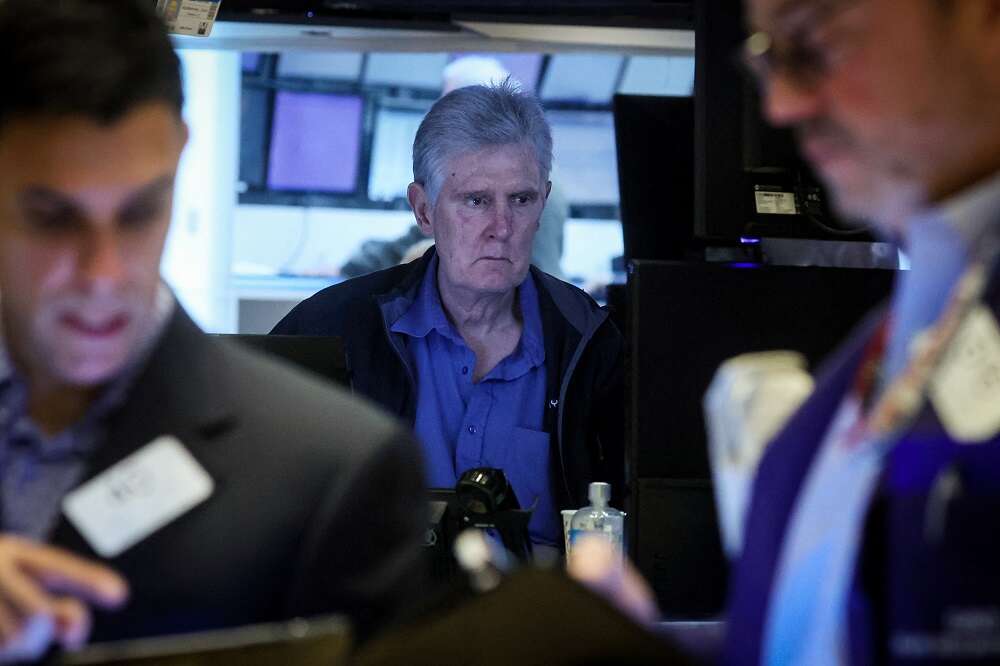
By Chris Prentice and Amanda Cooper
NEW YORK/LONDON (Reuters) – Global shares stemmed a five-session rout on Tuesday as bank shares rebounded and key U.S. inflation data was in line with expectations, bolstering bets of a smaller interest rate hike by the Federal Reserve at its meeting next week.
Bond yields in the U.S. and the euro zone rose after plunging the previous day, curbing a crisis-driven rally in gold.
Crude oil futures tumbled by $3 a barrel, and U.S. prices hit their lowest since December.
Data showed the U.S. Consumer Price Index (CPI) rose 0.4% in February versus 0.5% a month earlier. On a yearly basis, it rose 6.0% in February, compared with 6.4% in January.
U.S. Treasury yields moderately extended gains following the data, indicating some expectation that the Fed could continue to raise rates but at a gradual pace. [US/]
“The CPI report although in line and not perfect did not scream that they have no choice but to raise. The Fed still has options, which is a good thing,” said Jamie Cox, managing partner for Harris Financial Group in Richmond, Virginia.
Tuesday’s broad gains in equity markets signaled a “relief rally,” he said.
The Dow Jones Industrial Average rose 82.93 points, or 0.25%, to 31,899.22, the S&P 500 gained 33.43 points, or 0.87%, to 3,889.19, and the Nasdaq Composite gained 148.02 points, or 1.32%, to 11,336.22 by 2:14 p.m. EDT (1817 GMT).
U.S. bank stocks jumped, recovering some ground after the failure of Silicon Valley Bank and Signature Bank triggered heavy selling by investors.
European shares closed up 1.53%, notching their largest one-day gain since December and marking the first gain in four sessions. [.EU]
European banks rebounded 2.5%, one day after their largest one-day sell-off in over a year.
The MSCI All-World index reversed early losses to advance 0.35%, gaining for the first in six sessions.
As recently as a week ago, investors were just recovering from a reality check that prompted many to assume rates around the world were likely to head much higher and stay there for longer than previously expected.
“The 50-basis-point hikes are off the table for now. Markets are too fragile,” Harris Financial Group’s Cox said in a phone interview.
In under a week, three U.S. banks have collapsed. It was the failure of technology-sector lender Silicon Valley Bank (SVB) that rattled investor confidence and triggered a rush into safe-haven assets like bonds and gold.
On Tuesday, ratings agency Moody’s cut its outlook on the U.S. banking system to “negative” from “stable.”
Banking stocks around the world have shed hundreds of billions of dollars in value in a matter of days, while the government bond market has seen one of its biggest rallies in decades.
The two-year Treasury yield, which rises with traders’ expectations of higher Fed fund rates, touched 4.2797% compared with a U.S. close of 4.03% after Monday’s largest one-day drop since 1987.
Germany’s two-year yield rose 22.5 basis points to 2.928% after falling by 37 basis points a day earlier. It was not far from levels seen at the end of February.
Expectations for the peak of the ECB deposit rate dropped to around 3.4% on Monday from 4.1% last Thursday, with markets betting central banks would soften their policy stance as they assess financial stability risks.
Many have drawn parallels to the 2008 financial crisis, when indicators of financial market stress shot up and equities crumbled. But Societe Generale chief currency strategist Kit Juckes said the current situation was far more like the U.S. savings and loans crisis of the 1980s, in which hundreds of smaller banks folded when the Federal Reserve jacked up interest rates to control inflation.
SVB, which was the 16th biggest U.S. bank at the end of last year, is the largest lender to fail since 2008. The sharp rise in Fed rates in the last year, which tightened financial conditions in the startup space in which SVB was a notable player, was front and center.
“I don’t think this is a systemic global banking issue. If it’s an issue, it’s an issue of a smaller but less regulated bank that has been growing very fast on the back of being less regulated in a stable environment that has turned nasty,” Juckes said.
Overnight the VIX volatility index, nicknamed Wall Street’s “fear gauge,” neared six-month highs, and other indicators of market stress showed early signs of strain. An index of bond market volatility – the ICE BofA MOVE index – had hit a 14-year high by Monday’s close.
The euro was up 0.1% on the day at $1.0736, having gained 1.51% in a month, while the dollar index, which tracks the greenback against a basket of currencies of other major trading partners, was down at 103.63.
The dollar rose 0.8% against the yen to 134.24, with the yen pressured as recent safe-haven flows and Treasury yields reversed.
Gold’s safe-haven rally also dried up on Tuesday in the face of higher Treasury yields. Spot gold prices fell 0.3% to $1,907.58 an ounce.
Oil prices were down on lingering concerns that a fresh financial crisis could reduce future oil demand.
West Texas Intermediate crude futures fell 3.96%, or $2.97, to $71.83 a barrel. Brent crude, the global benchmark, fell 3.63%, or $2.93, to $77.84 [O/R]
Bicoin hit a nine-month high, taking gains past 30% in four sessions.
New York’s financial regulator said its decision to close Signature Bank had “nothing to do with crypto.”
(Reporting by Tom Westbrook Editing by Sonali Paul, Mark Potter and Leslie Adler)


